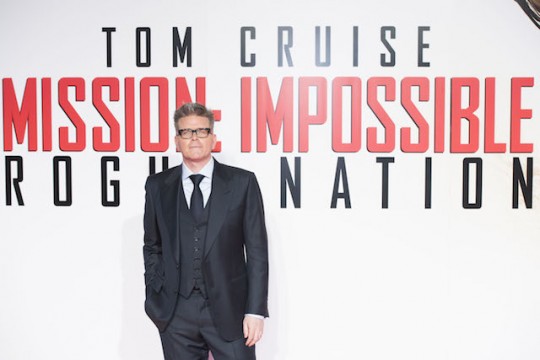I reviewed Mission: Impossible—Rogue Nation today despite the fact that it's been out for a couple of weekends because I wanted a chance to rave about Christopher McQuarrie, its director. Like everyone else, I loved The Usual Suspects (which he wrote and for which he won an Oscar), but it's The Way of the Gun that really made me sit up and take notice of the guy. A movie that's by turns smart and funny and brutal, it is sometimes (rather unfairly, to my mind) categorized as a "Tarantino knockoff." But it's so much more, and it's so depressing that McQuarrie spent 12 years out of the director's chair after its failure at the box office.
I'm fascinated by the way McQuarrie treats violence in his films. There's frequently a tonal dissonance at play, a movement between humor and intensity that some likely find offputting. Here's how he described his theory of violence to Empire:
It is, to me, morally wrong to fetishise violence. I have to be very careful with my words. You want the audience to enjoy certain acts of violence. An audience wants to enjoy certain acts of violence. An audience wants to experience certain kinds of intensity. They want to see certain bad guys get theirs. Personally, I believe there's a way to do it that's right and a way to do it that's wrong. There is no concept that is taboo. If you want to cut a guy's balls off, scalp a dude, kill little kids: that's all fair game. You can't be moral and ethical and be a filmmaker - you're just fooling yourself, you're just betraying yourself. But you can be moral and ethical in the way in which you present it. You can be creative and you can be smart in the way that you present it. Ultimately, for me, if death has no meaning, if the violence has no meaning, it has no impact, then it's morally wrong.
I find this all a bit surprising, in part because McQuarrie is better at mixing violence and humor than many filmmakers. The most famous scene in The Way of the Gun, for instance, comes as the film begins. (NSFW for language.)
A woman (played by Sarah Silverman, in a sublime bit of casting) is screaming obscenities at a pair of criminals, our protagonists. She is trying to convince her boyfriend to fight them. And a fight does commence, but in a way that deeply subverts our expectations: one of the criminals hauls back and slugs Silverman in her face while the other stomps on a different woman's foot. It's a jarring, hilarious moment, one that I've never failed to see prompt an involuntary guffaw from those watching it for the first time. And it contrasts quite strongly with the rest of the film, which features the most technically proficient shootout not filmed by Michael Mann I've ever seen and a torture scene so tense it makes the skin crawl.
The absurdity of violent death is played for kicks in Edge of Tomorrow, which he scripted. The funniest moments in that film come as Tom Cruise's character—who, after he is killed during an alien invasion, wakes up alive with the knowledge of how the previous day's battle went and is stuck in some sort of time loop—finds new and terrible ways to die as he memorizes the day of the battle. This mashup does a good job of highlighting the morbid hilarity inherent in never-ending extinction:
I think my favorite moment is when he rolls under the truck in an attempt to escape his platoon. "What the hell were you thinking," indeed.
There're also a couple of amusing fight scenes in Jack Reacher. The first takes place in the bar of a parking lot, as Reacher (Tom Cruise) explains exactly how the fight will play out. The second, though, is almost laugh-out-loud funny:
McQuarrie's work here calls to mind the hilarious scuffle in Raising Arizona that the Coen brothers set in a trailer: the tightness of space is played for kicks, with bad guys bumping into each other and weapons rendered useless by the confined quarters of the bathroom. It's clever and cute and funny—and vastly different from how violence is treated in the rest of the film. Jack Reacher opens with an almost unbearably tense sequence during which a sniper picks out his victims, and it closes with a brutal, rain-soaked fight in a quarry that culminates in our hero shooting the movie's villain in cold blood.
McQuarrie's willingness to mix it up tonally is one of the reasons I like his work so much. He keeps the audience on its toes and recognizes that different circumstances—different kinds of violence—call for different levels of seriousness. We need more people like him in Hollywood.
